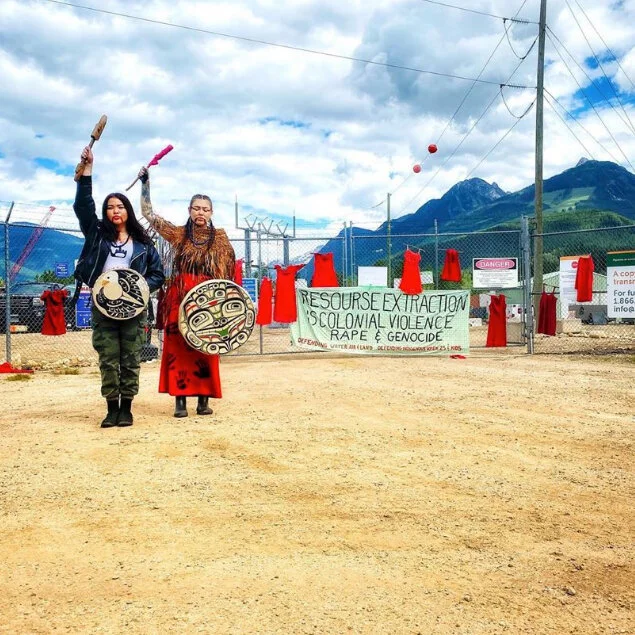Ayana and Pádraig explore the language of uncommon belonging; how we must learn from our shame and the danger of forgetting history, the life cycle of violence, the nature of colonial power, and how to confront the inheritance of privilege.
Read MoreAn on the ground interview between Maia Wikler and xʷ is xʷ čaa that goes beyond old-growth logging and big tree activism to explore Indigenous sovereignty, the responsibility of bearing witness, the importance of distinguishing between short term actions and more…
Tiokasin shares about the savior mentality that can arise when we act to address the many issues that threaten Earth and kin at this moment. Rather than being guided by solutions and salvation, we acknowledge where we are at in this consciousness and how we can challenge ourselves to give back to the Earth without intrusion.
Read MoreTyson calls us to unbrand our minds and deeply interrogate where we are sourcing our thoughts from, the ramifications of becoming a trauma-obsessed society, and how to identify environments for emergence.
Read MoreK’asheechtlaa shares the oral history of herring abundance in context to what a typical herring harvest looks like today, industry’s inability to act with reverence, and how Herring Protectors are working to protect the herring and the culture tied to them.
Read MoreWe begin by looking at how kincentricity is different from many other ecological teachings that remain mired in the historical legacy of environmentalism and science, a legacy which has historically disavowed the human as a way to exalt their respective fields, instead, Enrique provides examples of humans being “keystone species”.
Read MoreElla traces the powerful connection between our ability to go against mainstream capitalist ways of being and our capacity for deep connection with ourselves and each other. We interrogate how much of identity is our truth, and how much of it is the echoing trends of dominant culture.
Read MoreSo and Pinar explore how tracking and trailing answers the call of our ancestral bodies and the land, what deep intimacy with the more than human world looks like, how place-based skills are tools of liberation, and how to heal community; we cannot solely be in reciprocal relationships, we must be in accountable ones as well.
Read MoreCutcha shares how she has witnessed the impossible become possible, the long term effects of the California Gold Rush, the future-making power of Indigenous feminism, and the inherent anti-apocalyptic nature of cultural revitalization.
Read MoreIn this powerful conversation with land defender Sii-am Hamilton, we are invited to discuss futuristic ways forward in recognition that Indigenous communities have been practicing creative resistance against colonialism and capitalism for hundreds of years.
Read MoreCorrina reminds us that Ohlone territory still holds tremendous abundance and that the land can sustain us in a way that would provide for our wellbeing should we choose to really re-examine what it is we need to survive. We explore responsibility and reciprocity on stolen homelands by asking what it means to be in right relationship.
Read MoreDeb, Vanessa, and Rachael share about the 2019 fires, the role of Indigenous women in cultural burning, the relationship between kin and fire, and how the intensity and scale of these bushfires need to be situated in context to the Australian government’s continued aggressive expansion of fossil fuels and coal mining.
Read MoreAn ode to this “talisman of adaptation and creativity,” our interview with Rowen circles Native seeds, the myth of individual self sufficiency, the cultural dimensions of biodiversity, biocolonialism and safeguarding agricultural heritage against patenting, seed work as slow work, and reweaving cultures of belonging.
Read MoreAyana and Linda discuss what will be left in the wake of COVID-19, how will we tend to the wounds of disposability? What systems will endure? What must we dismantle and what will we grow? How can we deepen our actions so that they are not just a response to fear, but are rooted in the promise of collective wellbeing?
Read MoreWe are honored to once again share this episode with you as a profound reminder of the place we share with the qwe 'lhol mechen, their capacity for memory, grief, and love, and the many ways that the Lummi Nation continues to protect, defend, and restore the Salish Sea.
Read MoreUplifting the untold story of mining, this episode braids together the history of the Gold Rush and colonization in B.C., the state of salmon, the practice of free, prior, and informed consent, dirty mining for a “clean” energy revolution, and the urgent necessity of reform.
Read MoreEriel sheds light on what Unist’ot’en Camp represents, the ongoing history of surveillance faced by frontline protectors, how policy can be a tool of forced assimilation, and the illegality of the actions taken by Canada’s federal and provincial governments.
Read MoreDr. TallBear and Ayana confront western science’s continued appropriation of Indigenous sexuality, ancestry, and creation while unearthing our universal desires for love and belonging. Let us rekindle more generous and sustaining forms of intimacy that flow beyond the bounds of coupledom, embracing all of our kin alike.
Read MoreAyana and Kyle discuss Kyle’s body of work on dystopia and fantasy in climate justice, the reproduction of settler structures, Indigenous science, vulnerability discourses, and “decolonizing allyship.” Kyle concludes with the ever present reminder that our work must be rooted in consent, reciprocity, and trust.
Read MoreFall in love with the Tongass, as Elsa shares stories from the field, communities where boom and bust industry have torn people apart, and her personal journey as a second-generation activist.
Read More
![PÁDRAIG Ó TUAMA on Finding Uncommon Ground [ENCORE] /241](https://images.squarespace-cdn.com/content/v1/5403e5dbe4b04db10d1d362b/1625527799983-7B7NQ96Z8TBTJ5NDRDFY/PADRAIG-O-TUAMA_For-The-Wild_Episode2.jpg)


















